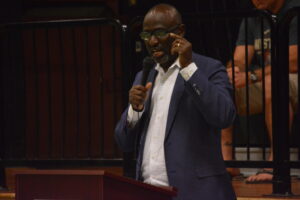As a leader in Maine’s growing Congolese community, Papy Bongibo said he was concerned about false rumors and a general lack of awareness about the threat posed by the coronavirus.
So last Sunday, he visited several Portland-area churches where immigrants gather to worship. And what he saw alarmed him.
Claude Rwaganje, a refugee from the Democratic Republican of Congo, serves on the Westbrook City Council. Chance Viles/American Journal
“I saw people hugging each other and I saw people shaking hands,” Bongibo, president of the Congolese Community of Maine, said Thursday. “It seemed like they were not taking it seriously so that’s why I asked for the microphone to speak.”
In the days since, Bongibo has been part of a vigorous, multi-pronged campaign among immigrant community leaders and health professionals to ensure the state’s growing population of “New Mainers” – many of whom speak limited English – are taking the necessary steps to protect themselves and their families.
“The word is getting out,” said Claude Rwaganje, founder and executive director of ProsperityME, a nonprofit that works with immigrants on issues such as financial education and career development. “That is for sure because at the beginning, people who were used to disasters in their home countries – such as wars – didn’t take this seriously.”
Groups in Portland, Lewiston and other cities are distributing pamphlets translated into nearly a dozen languages, recording informational videos on Facebook and sending out audio clips on the popular mobile platform WhatsApp. It is all aimed at informing a hard-to-reach population that doesn’t – or can’t – follow the news but could be highly vulnerable to a disease that readily spreads among people in close proximity.
“The disease is in the community, and anyone can catch it,” reads a script of an audio message that has been translated into seven languages and posted on various social media sites. “Keep your family and your community safe. Don’t catch the virus and don’t spread it.”
By now, most Mainers have received (and are hopefully heeding) the key messages on the COVID-19 disease caused by the coronavirus:
• Wash your hands vigorously, and frequently, for at least 20 seconds;
• Don’t touch your face or other people;
• Avoid crowded places;
• And if you must go out in public, try to maintain at least a 6-foot buffer from other people.
But getting through to Maine’s immigrant communities presents additional challenges.
Beyond the obvious language barriers, there are cultural hurdles unique to some of the immigrant groups that are moving to Maine.
In some cases, that involves teaching “social distancing” and buffer zones to people accustomed to embracing, clasping hands and touching others in daily life. In other cases, that means convincing individuals who fled ruthless dictatorships that a citywide “curfew” – as Portland announced this week – does not mean a total city lockdown enforced by heavily armed police or military.
“It is challenging. Cultural norms are very different,” said Tarlan Ahmadov, state refugee coordinator in the Office of Maine Refugee Services at Catholic Charities of Maine.
Maine is home to a sizable population of refugees from countries such as Somalia, Iraq and Syria, but also a growing number of asylum seekers from nations such as the Democratic Republic of Congo, Angola, Burundi, Rwanda and Sudan.
Ahmadov’s office, which administers the federal refugee resettlement programs in Maine, received packages of flyers on coronavirus-related hygiene and best practices that had been translated into eight languages. His office then sent them to more than 300 people in schools, human resource departments and nonprofits that serve immigrants.
They also translated and distributed additional materials from the U.S. Centers for Disease Control and Prevention that contain both words and illustrations for those who may be illiterate even in their native languages.
“I cannot even tell you how many people – from Portland city and Lewiston city to first responders and police departments – have been so supportive,” Ahmadov said.
In an effort to help spread the word, a large number of immigrant community leaders from around the state participated in a recent conference call with Dr. Nirav Shah, director of the Maine CDC, and other health officials. Ahmadov credited Shah, in particular, and other Mills administration officials for their eagerness to help.
Over a one-week period, the number of COVID-19 cases in Maine grew from a single person to 52 as of Thursday morning. As concerns grew about coronavirus in Maine, organizations that work with immigrants began spreading the word in the various communities.
The city of Lewiston, working with community partners, posted informational videos in six languages that utilize federal and state health guidelines to walk viewers through proper hand-washing techniques, social distancing, signs and symptoms of COVID-19, and insurance questions about treatment.
Organizations such as the Maine Immigrants’ Rights Coalition in Lewiston began posting on Facebook those translated flyers and other informational videos recorded by community members in various languages.
In one such video, Bongibo, with the Congolese Community of Maine, recaps in French and Lingala the latest information from the Maine CDC and the Mills’ administration as well as the importance of protecting oneself from the disease. Because many Congolese in Maine either do not or cannot follow the news, Bongibo said, rumors spread easily, including one he heard repeatedly that coronavirus only afflicts Caucasians.
“I tell them, ‘If you get infected, you are going to be quarantined, you are going to be isolated. You may (recover) or you may be gone for life. So don’t be that person,’ ” Boginbo said.
Rwaganje, a refugee from the Democratic Republican of Congo who now serves on the Westbrook City Council, said he is extremely concerned about how Maine’s immigrant workforce will be affected by the work stoppages. He also worries whether the many immigrants who help care for home-bound individuals are receiving adequate training and personal equipment needed to protect themselves, their families and their clients from the virus.
“We have so many who have jobs that they cannot work from home,” Rwaganje said.
Source: Portland Press Herald



